Cannabis Education is Growing to Meet the Needs of a New Industry
Dramatic growth in the newly-legal cannabis market has caused a pressing need for cannabis-related jobs and education. The widespread movement toward legalization of marijuana in many parts of the world has taken the business and medical worlds by storm. The world of education is adapting to meet the huge demand for specialized workers and business owners that this rapidly-growing cannabis industry is poised to create. Colleges, universities, and independent cannabis schools the world over have begun offering cannabis-related degree and certificate programs, preparing a skilled workforce for this brand-new industry.
The widespread movement toward legalization of marijuana in many parts of the world has taken the business and medical worlds by storm. The world of education is adapting to meet the huge demand for specialized workers and business owners that this rapidly-growing cannabis industry is poised to create. Colleges, universities, and independent cannabis schools the world over have begun offering cannabis-related degree and certificate programs, preparing a skilled workforce for this brand-new industry.
The cannabis industry: brand-new and booming
In recent years, the legal and social climate surrounding weed has grown far more favorable in much of the world. Over 50 countries have legalized cannabis in some capacity – for medical use only, in most cases. Recreational use of weed is also steadily gaining acceptance in more and more places. The production of industrial hemp and of CBD products (which are derived from cannabis or hemp plants) are poised to experience massive growth, as well.
In order to bring cannabis to consumers in all of its legal forms, a brand-new industry has had to essentially rise up out of nowhere. Naturally, the creation of this new industry means that a huge number of cannabis-related jobs will continue to be created. Educational institutions are adapting to meet the new demand for courses and degree programs that will give graduates the knowledge and credentials they’ll need to be successful in the cannabis industry and help it grow.

In order to bring cannabis to consumers in all of its legal forms, a brand-new industry has had to essentially rise up out of nowhere.
Dramatic growth is in store for cannabis
To give an idea of just how huge the cannabis industry already is: over 260 million people worldwide identify as active cannabis users, and we can only expect to see that number rise as cannabis use becomes legal and more socially acceptable in still more locations. The global legal cannabis market in 2019 was estimated at approximately $24 billion USD. That number is projected to surpass $66 billion USD by the end of 2025.
CBD and industrial hemp
Even in regions where marijuana and all products containing the psychoactive compound THC (tetrahydrocannabinol) are illegal, industrial hemp and CBD products are rising in popularity. Industrial hemp is a strain of cannabis specifically bred to be non-psychoactive. Industrial hemp is used in the production of food, textiles, rope, paper, plastics, and fuel. Hemp-derived CBD (cannabidiol) products are also non-psychoactive and are becoming incredibly popular for their impressive array of health and wellness benefits.
The global CBD market was worth approximately $462 million USD in 2018 and it’s grown so rapidly that it is projected to exceed $2 billion USD by 2023. The global market for industrial hemp was close to $4 billion USD in 2018 and is projected to grow to approximately $9.64 billion USD by 2025.
The North American cannabis market
Though cannabis remains illegal at the Federal level in the United States, a large number of U.S. states have legalized its use. In most states, this is for medical purposes only, though a growing number of states now permit recreational marijuana use. Legal cannabis sales in the United States have grown dramatically over the last decade and are expected to continue that trend. In 2010, legal cannabis sales in the U.S. were estimated at around $1.5 billion. This number rose to $11.9 billion in 2018. Analysts have estimated that the legal cannabis market in the United States will exceed $24 billion by 2025.
By 2020, the United States market for recreational weed is projected to reach $11.2 billion, the potential is there to hit $80 billion by 2030. The United States market for CBD is projected to reach $1.6 billion by 2021 or sooner.

Legal cannabis sales in the United States have grown dramatically over the last decade and are expected to continue that trend.
Enormous growth expected in the newly-legal Candian market
In Canada, where cannabis was recently completely legalized for medicinal and recreational use, the cannabis market is expected to skyrocket from only $569 million USD in 2018 to $5.2 billion USD by 2024.
The European cannabis market
The European marijuana market is still somewhat reserved in its reception of cannabis as a medicinal treatment. The process of opening and operating cannabis dispensaries is not as simple in Europe as in North America. European countries place a high priority on the regulation of the medicinal cannabis industry and are very discerning regarding the adequacy of cannabis education and training programs for medical professionals. The United Kingdom and Germany are currently in the process of developing cannabis education programs for doctors.
Germany dominates the medical cannabis market
Since legalizing the medical use of cannabis in 2017, Germany has emerged as the biggest medical marijuana market in the world. In its first two years of legalization, the number of German patients receiving medical marijuana grew from a mere 1,000 people to 30,000.
Australian Cannabis Market
In Australia, cannabis is legal for patients with certain medical conditions, but recreational weed use is not yet legal. Australia is, however, positioning itself as a dominant exporter of marijuana. Australia’s legal cannabis market was valued at $52 million USD in 2018 and is expected to reach $1.2 billion USD in 2027.
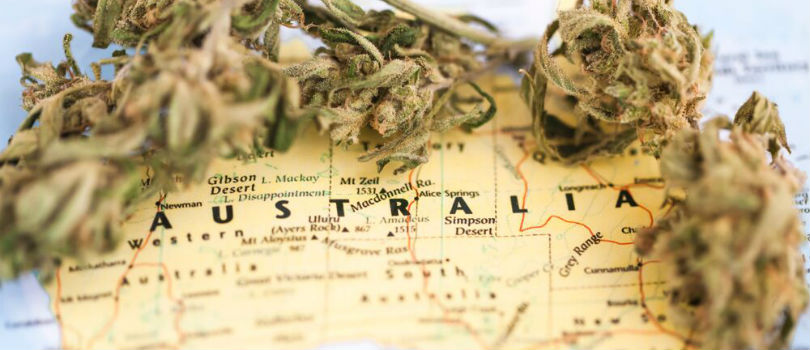
Australia is positioning itself as a dominant exporter of marijuana.
A new industry requires new jobs
These rapidly growing worldwide cannabis markets indicate an urgent need to fill the new positions necessary to grow this new industry. Job opportunities in the U.S. cannabis industry alone increased by 76% from December 2017 to December 2018. Demand is expected to continue rising as the industry grows and still more states approve cannabis legalization.
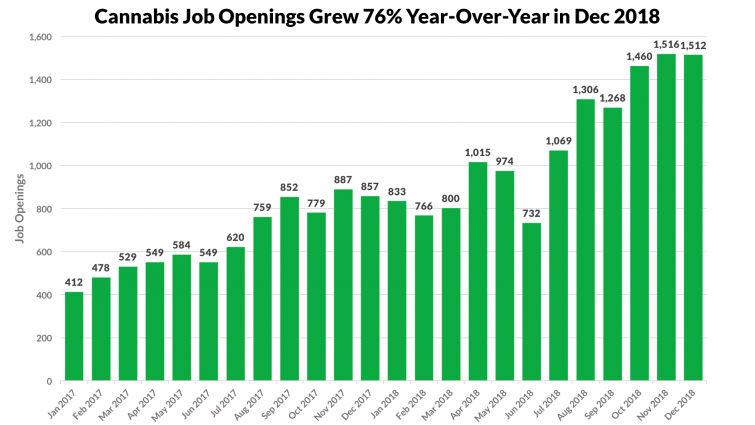
Employment numbers
About 200,000 people were employed in the U.S. cannabis industry in 2017. The industry has been projected to reach (or exceed) 500,000 jobs by 2022, and climb to 630,000 by 2025. These estimates are only based on the states where marijuana is currently legal, and will likely be markedly higher as additional states legalize weed.
The median salary for employees of the U.S. cannabis industry was ranked at just over $58,000 per year in 2018 (higher than the overall U.S. median salary). However, in 2017, CNBC reported that it’s not uncommon for those who have obtained a B.A. in marijuana studies to find
A growing field of study
One reason why the cannabis industry job market has grown so dramatically is that the growing, selling, prescribing, and dispensing of cannabis affects so many sectors. Whether your interests lie in health care, law, political science, journalism, chemistry, biology, agriculture, business, marketing, or general cannabis studies, there are ample opportunities to incorporate that area of expertise into a career in the cannabis industry.
The humble beginnings of cannabis education
Before cannabis was legalized, there were very few opportunities to formally learn about it, unless you found an underground weed enthusiast to coach you. If you had studied chemistry and botany, you may have been able to apply some of the knowledge gained from the study of other plants to marijuana. But even scientists and researchers from prestigious institutions and organizations could not obtain cannabis samples to study. Around 2009, things began to change on the cannabis education front, when several small cannabis schools emerged. But it was not until around 2017 when accredited colleges and universities began announcing that they would be including cannabis studies in their curriculum.

Colleges and universities began announcing that they would be including cannabis studies in their curriculum.
Oaksterdam University
The first known formal cannabis school, Oaksterdam University, was founded in California in 2007 by cannabis activist Richard Lee. Oaksterdam University takes its name from a combination of Oakland (the city where it is located) and Amsterdam, where Lee had experienced a museum and “cannabis college” that inspired him to bring a similar program to the U.S. Oaksterdam’s very first class had only 20 students, but in just 2 years, class sizes had increased to around 120 students and the school had to relocate to a bigger space. Now, Oaksterdam University boasts over 40,000 alumni and 35,000 graduates from over 40 countries. Oaksterdam is still located in Oakland, California. They are developing online courses in cannabis horticulture and business to reach a much wider worldwide audience.
Colorado Kindness Association
Another activist group turned educational institution is the Colorado Kindness Association (CKA). Founded in 2009, CKA provided free medical marijuana and growing classes to the financially and medically needy. The free weed was donated by growers with excess crops. Legal changes the following year prohibited CKA from continuing to dispense cannabis, so they shifted gears and became the Grow School. Their very first class consisted of only 7 students, but the Grow School continued to, well, grow. The school now offers a wide variety of online cannabis classes.
Majoring in marijuana
The course offerings in marijuana studies at 4-year colleges and universities may still be a bit scattered and sparse. But it is expected that existing programs will be expanded, and other schools will continue to add courses and degree programs as the demand for cannabis industry professionals increases.
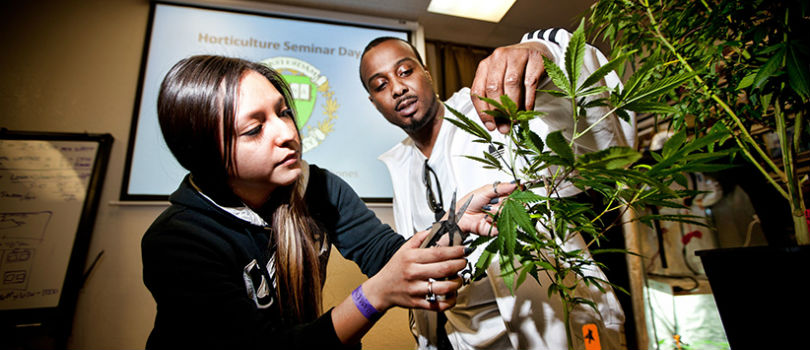
Schools will continue to add courses and degree programs as the demand for cannabis industry professionals increases.
Where can you get a degree in cannabis studies?
United States colleges and universities
- Currently, the closest thing you can get to a B.S. in marijuana studies at an accredited U.S. college or university is Northern Michigan University’s medicinal plant chemistry degree program. In this program’s first semester, in 2017, there were only 20 students enrolled. The following year, over 220 students enrolled. Students who enrolled in this program not only hailed from Michigan but also from 48 other states. The enrollment of large numbers of out-of-state students is rare for remote, regional universities like NMU. This just goes to show how much demand there already is for B.S. degrees in the cannabis industry.
- Another remote regional school, Lake Superior State University, now offers B.S. and A.S. degrees in the United States’ first fully accredited university cannabis chemistry degree program.
- The University of Maryland School of Pharmacy has launched a Master’s degree program for the study of medical cannabis science and therapeutics.
- The University of Vermont offers “Cannabis Science and Medicine” certificate programs, teaching cannabis chemistry, biology, and the effects of cannabis on the body.
- The University of California at Davis has recently added two new cannabis-related courses. One of these is a graduate course on the marijuana plant and its impact on people. UC Davis has also added a Physiology of Cannabis course covering the effects of cannabis and cannabinoids on the body as well as the history and potential medical applications of cannabis.
- Cornell University’s School of Integrative Plant Medicine now offers a “Cannabis: Biology, Society, and Industry” course. Cornell is also developing a Master’s degree program in cannabis studies.
- Stockton University in New Jersey launched a “cannabis studies” minor, which filled up quickly, with 15 students declaring the minor in the program’s first year.
- The University of Washington has added modules to its health care curriculum on medical cannabis best practices.
- Ohio State University Law School now teaches a Marijuana Law, Policy, and Reform Seminar.
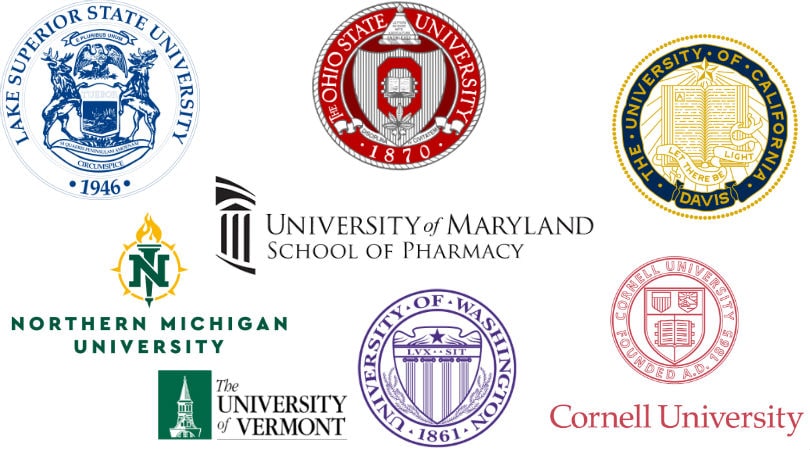
Canada
Despite the rising demand for jobs in the cannabis industry and a growing embrace of cannabis in Canada, the turnout for cannabis degree programs is still low in Canada. This seems to be due in large part to students’ fear of stigmatization for choosing to major in cannabis studies.
- UQTR (the University of Quebec in Trois Rivieres)’s new cannabis-focused biochemistry degree program launched in autumn 2019. Even though this is the first and only B.S. degree program in this field, students were not quick to enroll, and it was more difficult than expected to fill the 30 available positions in this program.
- You can now study commercial cannabis production at Ontario’s Niagara College.
- College of the Rockies and Durham College offer cannabis retail specialist programs that teach the science of cannabis alongside budtending and cannabis-industry business classes.
- Montreal, Quebec’s McGill University will begin offering a full graduate degree program in cannabis production in 2020. This degree program will only be open to students who are already majoring in botany or similar fields.
- Community College of New Brunswick currently offers a certificate program in cannabis cultivation.
- College Boreal (Sudbury, Ontario), Camosun College, and Okanagan College have recently added cannabis-related courses to their curriculum.
- Nova Scotia’s St. Francis Xavier University is allowing 20-30 students to earn college credit by working in a dispensary they’ve partnered with.
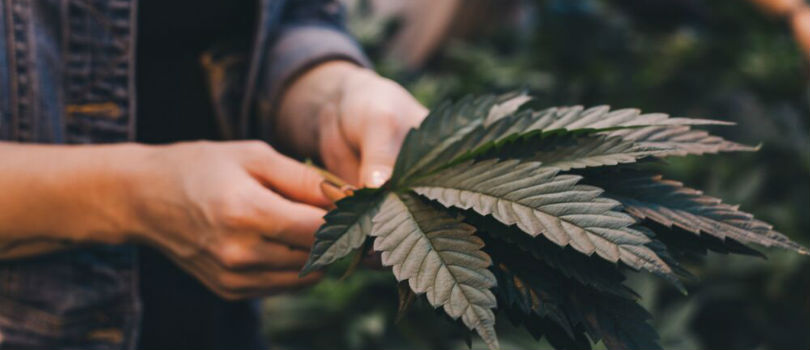
In Canada, students fear of stigmatization for choosing to major in cannabis studies.
Canadian online college courses
Kwantlen Polytechnic University now offers several specific online cannabis training programs.
Mount Royal University’s cannabis education program can also be completed online.
Independent cannabis schools
Traditional four-year colleges and universities are certainly not the only places where you can dive into cannabis studies. In addition to Oaksterdam University and the Grow School, a considerable number of independent cannabis schools have been founded.
Clover Leaf University, founded in Denver, Colorado in 2009, is the first of these independent schools to be approved, regulated, and licensed by the Colorado Department of Higher Education’s Private Occupational School Board. You can earn several different cannabis industry certifications through Clover Leaf. In addition to classes at their Denver campus, Clover Leaf University regularly holds cannabis training sessions all over the world. They are in the process of creating an online program for students who are not local to Denver.
Trichome Institute, another cannabis school, with campuses in Denver, Colorado and Portland, Oregon, is also developing online classes. A few of these classes are already online, with more to come.
Cleveland School of Cannabis is another brick and mortar institution providing cannabis certifications for growers, medical professionals, and dispensaries. They have two campuses, in the cities of Cleveland and Columbus, Ohio.

Traditional four-year colleges and universities are certainly not the only places where you can dive into cannabis studies.
Online cannabis schools
If you prefer to take all of your classes online, or if you don’t live close to a brick and mortar cannabis school, there are a growing number of online cannabis education programs to choose from. All-purpose online “cannabis colleges” offer classes in everything from growing and cooking cannabis to the legal, medical, and business aspects of the cannabis industry.
It is important to note that online and other independent cannabis certifications may not meet the qualifications required for all types of jobs in the cannabis industry. Many employers will prefer or only hire job applicants who have received their degree from an accredited college or university. However, for some entry-level positions, or if you desire to open your own cannabis business, the knowledge gained from these independent educational programs may be exactly what you need to get started.
Humboldt Cannabis College (also known as 707 Cannabis College), is located in Humboldt County, California, an area famous for its marijuana culture. This school was founded in 2010 by Oaksterdam alumnus Kellie Dodd. Dodd wished to expand upon the curriculum she studied at Oaksterdam, adding special focus in areas such as environmentally-friendly growing methods.
Founded in 2013, in Denver, Colorado, THC University’s very first in-person class hosted only 20 students. Today, over 10,000 students have received cannabis certifications through THC University’s online programs.
Green CulturED was founded in 2012 in Denver, Colorado. All of their certifications and classes are accessible as part of a monthly membership. These memberships can be formatted for an individual student or to train an entire staff of employees. Green CulturED currently offers 7 specialized certifications, including Dispensary Technician Certification and Master Grower Certification. They are also authorized to provide training for Alaska’s mandatory Marijuana Handler Permit.
Cannabis Training University was founded as a brick-and-mortar school hosting seminar-style classes in San Francisco in 2009. In 2011, CTU expanded its curriculum and moved it online so they could reach a wider audience.
MediHuanna is an Australian online school, providing cannabis education programs specifically for doctors and pharmacists in Australia.

There are a growing number of online cannabis education programs to choose from.
The International Cannabis and Cannabinoids Institute (ICCI) is another online school tailored to medical professionals. ICCI’s programs include frequently updated, country-specific legal and regulatory information for healthcare practitioners in Canada, the Czech Republic, Germany, Ireland, the Netherlands, and the United Kingdom. ICCI has teamed up with TheAnswerPage.com, an educational service for medical providers, to create the International Comprehensive Cannabis Course.
Completion of this online course qualifies for credit from a number of associations, including the Accreditation Council for Continuing Medical Education (ACCME), Accreditation Council for Pharmacy Education (ACPE), American Association of Nurse Practitioners (AANP), American Nurses Credentialing Center (ANCC), and the American Psychological Association (APA). This course may also count toward credit through Canada’s Royal College Maintenance of Certification (MOC), the Provincial Colleges of Pharmacy, and the New Zealand College of General Practitioners.
Demand for cannabis education is certain to keep growing
The cannabis industry is poised for remarkable growth in the places where it is currently legal. As more states and countries legalize cannabis for medicinal or recreational use, and the popularity of CBD products and industrial hemp continues to rise, so too will an astronomical need for knowledgable cannabis industry workers and new business owners. Colleges, universities, and specialty schools are working quickly to expand their course offerings and accommodate this growing need. There is a very real opportunity for properly educated cannabis enthusiasts (with a head for business, science, law, or agriculture) to find jobs with above-average salaries in this exciting new industry.
